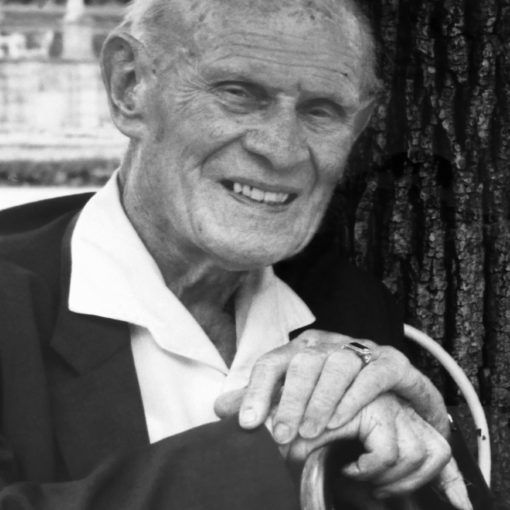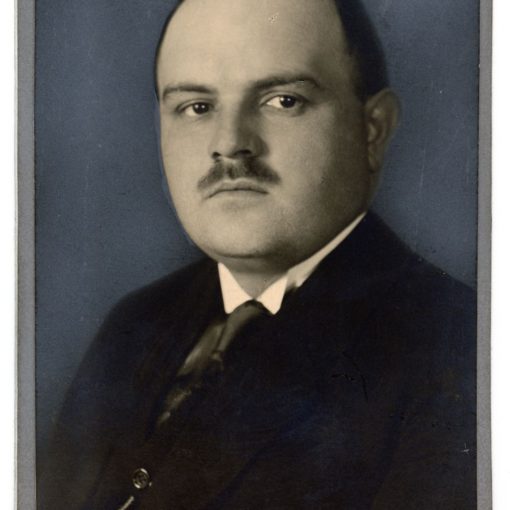
Bro. Hynek Puc was born on 1 October 1856 in Benátky nad Jizerou (formerly Nové Benátky) in the family of shoemaker Josef Puc. He graduated from the Secondary Industrial School of Mechanical Engineering in Prague. He worked as a machinist at the Edvard Lokeš and Son factory in Prague, making bronze and other metal goods, haberdashery and jewellery. There he met Jindřich Waldes, an enterprising businessman. In 1902, they founded the public trading company Waldes and Co. together and in a wooden building in Letná, they began to produce mechanical clothespins – press buttons, press studs.
In 1903, Hynek Puc built a material folder, which replaced manual work with tweezers and enabled the machine to insert a spring into the spring part of the button. The production of press studs was thus mechanised and productivity increased many times over. The enterprise was moved to Karlín, Pernerova (then Žižkova) Street. In 1906, the builder Alois Richter designed and carried out the construction of a new factory for 600 employees in Vršovice, opposite the then Vozatajské barracks. The complex consisted of a large production hall, a machine room with a boiler room and an administrative building at the corner of Vršovická and Moskevská Street, where employees also had a spa, a gym and a library. In 1912, architect Ladislav Skřivánek designed a new five-storey factory building on Kavkazská Street. The building was not completed until 1920. The two-storey building consists of nine production halls. The next and largest building on the site was designed in June 1920 by the civil engineer and builder Jindřich Pollert (1878-1944). The six-storey building with a stair tower attached to the north is made up of a two-span reinforced concrete skeleton. In the 1920s, Waldeska produced up to half of the world’s metal accessories and exported them to 73 countries. The partner Hynek Puc was replaced in 1930 by his son Vojtěch, who was also the director of the Vršovice factory. Branches were established in Vienna, Barcelona, Dresden, London, Paris, Warsaw and New York, and the company had 664 patents and 3,748 trademarks registered worldwide. The most famous of which, the face of a girl with a press stud in her eye, dates from 1913 and is a portrait of the model Elizabeth Coyens, drawn by František Kupka and designed by Vojtěch Preissig. The success of Waldes’ company was based, like Baťa’s, on constant design improvements, production of its own machines, good work organisation, administration and, last but not least, on quality advertising. Jindřich Waldes and Bro. Hynek Puc also worked closely with Tomáš Baťa and, among other things, supplied him with press buttons for his shoes. In 1939, the factory was aryanised and its contact with foreign branches forcibly cut off. After nationalisation in 1946, it was incorporated into a concern called Koh-i-Noor. By privatisation in 1994, the company was acquired by Koh-i-Noor, PLC., which continued the company’s tradition and produced a wide range of goods. The original administration building has now been rebuilt and the production hall has been modernised, the storey buildings are preserved in their original state, except for the window panes.
Hynek Puc was inducted into the Národ Lodge on 15 June 1919 by confirmation of the Italian Grand Lodge Nazionale di Roma and confirmed in the Master’s Degree. He did indeed work as a Mason and also made it to the Grand Council of the National Grand Lodge of Czechoslovakia in 1921. He is also affiliated with the Dílo Lodge in 1921 and retains membership in the Národ Lodge as well.
Bro. Hynek Puc died on 20 May 1938 in Dobřichovice, where the Puc family still owns his villa near the railway station. His grave in the Vinohrady Cemetery was designed by the later Worshipful Master of the Národ Lodge, Karel Štipl, whose work is still on display at Hynek Puc’s grave.
Luboš T.



